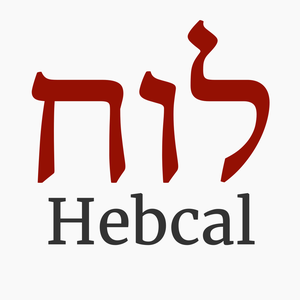Your comments
Thanks for the bug report on the Chofetz Chaim calendar. We will investigate.
Regarding displaying Hebrew months at the top, sorry, we don't have that option. Because the website provides Jewish holiday calendars in the context of the Gregorian calendar, the primary way of displaying months is via the Gregorian calendar. We might be able to modify the website so a month display like "February 2023" also displays "Tevet / Sh'vat 5784" next to or under the Gregorian month. Would that help?
Thanks for using Hebcal. Can you send us a photo or a screenshot of what you mean by "the actual month name gets cut off"?
Thank you for the suggestion! We will add this excellent idea to our "to do" list
oh, that's too bad! Our iCalendar feeds already contain the aforementioned category data, so it's disappointing that Google Calendar doesn't expose the iCalendar CATEGORIES field to AppSheet. Maybe you can try contacting AppSheet customer support?
yes, events in Hebcal already have categories (major, minor, modern holiday, public fast, special Shabbat, Rosh Chodesh, etc).
Perhaps you can import several Hebcal calendars into Google Calendar, and each one will be a separate AppSheet data source?
Hi, thanks for your message!
We are not AppSheet experts. Have you tried bringing Hebcal data into Google Calendar, and then from Google Calendar into AppSheet?
https://support.google.com/appsheet/answer/10106764?hl=en#add-data-source
https://www.hebcal.com/home/60/google-calendar-jewish-holidays
Hi, thanks for your message. We're not sure what you mean by glitch? The web page looks correct to us.
https://www.hebcal.com/converter?gd=20&gm=6&gy=2024&g2h=1
Thu, 20 June 2024 = 14th of Sivan, 5784
י״ד בְּסִיוָן תשפ״ד
When you click on the parsha link, it takes you to the Torah reading for that week which is Parashat Beha’alotcha. The date listed on the Parashat Beha’alotcha page is always the Shabbat that the parsha is read... in this case, it is Saturday, 22 June 2024.
If you see a page that incorrectly has the date June 26 on it, could you send the URL and/or a screenshot?
Thanks for using the Hebcal date converter.
Unfortunately, no, we do not offer a timezone parameter or another web API to determine the Hebrew date based on the current date in a timezone.
You can do this in JavaScript using our Zmanim JavaScript API using something like the following code
const {Location, Zmanim, HDate} = require('@hebcal/core');
const location = Location.lookup('Boston');
const now = new Date();
const zmanim = new Zmanim(location, now, false);
const sunset = zmanim.sunset();
let hd = new HDate(now);
if (now >= sunset) {
hd = hd.next();
}Customer support service by UserEcho


We're having trouble finding the xx's bug on the Chofetz Chaim calendar. Can you send a screenshot or a URL where you observe the problem?
We've begun the work to add the Hebrew months next to the Gregorian months. It's currently implemented only in English (e.g. Sephardic and Ashkenazic transliterations). We need to do some further work to enable this for Hebrew and other languages (Spanish, German, French, Russian, Polish, etc)